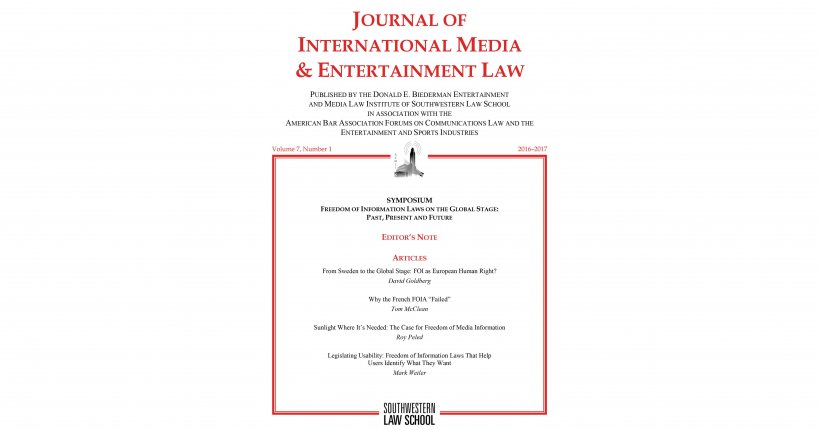SWLAW Blog | Faculty Features

June 2, 2017
New Issue of JIMEL
The latest issue of Southwestern's Journal of International Media and Entertainment Law is now posted on our website on the JIMEL page. Volume 7 is dedicated entirely to the November 2016 symposium, Freedom of Information Laws on the Global Stage: Past Present and Future.
Professor Michael Epstein, Supervising Editor of the Journal of International Media and Entertainment Law, describes the issue this way:
"The first article, From Sweden to the Global Stage: FOI as a European HumanRight? by U.K.-based media law professor David Goldberg, sets the stage for the historical context of the conference. A groundbreaking scholar on the history of freedom of information laws, Professor Goldberg poses the question: Does the European Court of Human Rights have an opportunity to declare freedom of information as a stand-alone human right?
Tom McClean, in Why the French FOIA Law Failed, argues that France’s 1978 statute has effectively been a “failure,” despite its similarity in text to FOIA laws in other countries. Dr. McClean, the head of the Uniting Organization in Australia, traces low use of the French statute to the institutional, social and political context into which the law was introduced.
In Sunlight Where It’s Needed: The Case for Media Information, Professor Roy Peled posits an “accountability gap” between the media’s role in democratic societies and its scrutiny-free operation. Mindful of press freedoms, Professor Peled, an information expert who teaches at the Hebrew University, calls for creating disclosure requirements for news organizations and social media to reduce censorship and curb irresponsible media behavior.
This issue’s final article, Legislating Usability: Freedom of Information Laws that Help Users Identify What They Want, by Dr. Mark Weiler, offers a fascinating analysis of the description conventions that must be in place before the government can identify and retrieve information. Dr. Weiler, a library studies scholar at Wilfrid Laurier University in Canada, contends that government officials and civil oversight groups could improve usability of FOI statutes by recognizing the importance of statutory clauses that require government bodies to publish descriptions to facilitate access.
A second group of symposium articles will be published in Issue 2 of this volume."